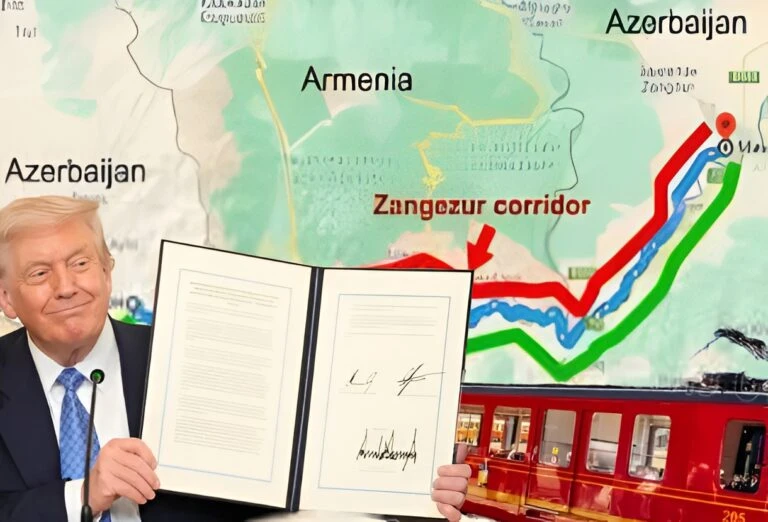As part of an agreement signed between Azerbaijan and Armenia in Washington last Friday, Armenia has granted the US exclusive rights to develop a corridor in its southern Syunik province, which borders Iran, to connect Azerbaijan to Nakhchivan. While in principle, Iran welcome the Agreement on Establishment of Peace and Inter-State Relations between the Republic of Armenia and the Republic of Azerbaijan, which, according to the US, who brokered the deal, aims to foster peace and stability between the two nations and the wider region, Iran, which has long opposed the concept, still believes it would alter the geopolitical landscape of the Southern Caucasus and limit Iran’s access to transport networks in the area.
DOCUMENT: Agreement on Establishment of Peace and Inter-State Relations between the Republic of Azerbaijan and the Republic of Armenia (Azerbaijan Ministry of Fpreign Affairs)Ali Akbar Velayati, a high-ranking Iranian official, has emphasised during an interview with the Tasnim news agency that Iran would resist the creation of a US-controlled transportation and energy corridor in Armenia, which, in his view, poses significant threats to regional stability. Velayati, often nicknamed the doyen of Iranian diplomacy, said:
“the southern Caucasus is important to Iran’s security and not a no man’s land for Donald Trump to lease as a real estate agent.”
Velayati, who acts as a senior advisor to Iran’s Supreme Leader Ayatollah Seyyed Ali Khamenei, announced on Saturday that Iran would obstruct the formation of the so-called Zangezur corridor, which, according to reports, will be renamed the Trump Route for International Peace and Prosperity (TRIPP). Similar to Russian President Vladimir Putin’s repeated warnings that Moscow will take action if Ukraine pursues NATO membership, Iran is expected to perceive a NATO/US presence near its border as a provocation, which could elicit a response from the Islamic State. Many experts have already indicated that a US-NATO corridor linking the Azerbaijan Republic to the autonomous region of Nakhchivan would be seen as an occupation of Armenian territory, which would ultimately sever Armenia’s direct land route to its vital southern trading partner, Iran.


Richard Giragosian, the director of the Regional Studies Centre in Yerevan, has voiced scepticism about the plan, stating:
“I don’t take the proposal very seriously… scepticism better defines the view in both Baku and Yerevan.” Calling Trump’s proposal “a reckless real estate deal,” adding, “It’s more about pursuing a [Nobel] Peace Prize for President Donald Trump…without any real preparation and little potential for follow through.”
US private company going in and managing road and rail while it’s Russian-owned or managed seems a very challenging task, Giragosian concluded.
During the weekend, Russia reiterated that the normalisation process between Azerbaijan and Armenia “found its root in the trilateral statement by the President of the Republic of Azerbaijan, the Prime Minister of the Republic of Armenia, and the President of the Russian Federation on November 9, 2020, with Russia playing a pivotal role and making a direct contribution. Ministry spokesperson Maria Zakharova emphasised that the most effective way to address the issues in the South Caucasus would be through “solutions developed and executed by the regional countries, with the backing of their immediate neighbours Russia, Iran, and Turkey.” She also mentioned that they would assess the statements made by the US concerning the opening of the so-called Trump Route for International Peace and Prosperity (TRIPP). Aydın Sezer, a seasoned foreign policy expert who has analysed the geopolitical shift in the Caucasus, questions whether and how the agreement signed by Aliyev and Pashinyan would be executed. This is particularly concerning for Armenia, where the opposition perceives the corridor as a present being given to the US, and with elections approaching in Armenia next year, there is a significant possibility that the declaration signed at the White House may be dismissed in the Armenian parliament or at the constitutional court. Interestingly, during the Tripartite Joint Declaration signature ceremony, when Armenia agreed for the Zangezur Corridor to be leased to the U.S. for 99 Years, Trump also announced the repeal of Section 907 of a special provision amendment added to the 1992 “Freedom Support Act,” which prohibited Azerbaijan from receiving direct government assistance from the U.S. government.
DOCUMENT: Joint Declaration signed at a meeting between the President of Azerbaijan and the Prime Minister of Armenia held in Washington (Source: Official Webpage of the President of the Republic of Azerbaijan, Ilham Aliyev)
Lotfali Bakhshi, the Vice President of the Iranian Economists Association, wrote in the outlet Donya-e-Eqtesad that Iran’s trade with Europe and the Transcaucasus has long relied on land routes through Armenia. The recent U.S.-brokered agreement between Azerbaijan and Armenia could disrupt this route. So what can Iran do in response? Rokna Political ِDesk explains that while international law typically does not recognise changes to borders, internal changes affecting a third party’s access rights exist in a grey area. Iran could argue for a necessary trade route, potentially gaining support from neutral countries and raising global awareness of its challenges. Establishing a legal-diplomatic group with international law experts and experienced diplomats is crucial to building a case regarding access rights and relevant laws. Although Armenia controls the territory, constructing ‘overpasses or underpasses’ could facilitate land connectivity between Iran and Armenia. This access issue could be a key demand in future negotiations with the U.S., with requests for these passages as a condition for agreements involving the U.S., Azerbaijan, and Armenia to maintain direct connections.
From a geopolitical perspective, Turkey has essentially transferred its sphere of influence and impact in the Caucasus to the United States, a new process that will fundamentally alter the existing balance of power in the South Caucasus, whilst inviting unwanted tension in the region…

Iran International reports…
Iran angered by US-backed plan to develop Armenian trade corridor
Tehran has condemned US plans to develop Armenia’s Zangezur corridor as part of a peace deal with Azerbaijan, branding it a challenge to regional security, a senior Iranian diplomat said.
On Friday, Armenia and Azerbaijan signed a deal at the White House to settle a long-standing dispute over the corridor, a strip of land which became a flash point in the two rivals’ decades-long conflict.
The deal gives Washington leasing rights to develop the transit corridor, which would connect Azerbaijan with its exclave, Nakhchivan. It will be renamed the Trump Route for International Peace and Prosperity (TRIPP). Though it will operate under Armenian legal jurisdiction, the US will lease the land to a private American company to manage construction and logistics.
“The Islamic Republic will not easily overlook the issue of Zangezur,” Ali Bagheri Kani, the secretary of Iran’s Strategic Council on Foreign Relations, told state broadcaster IRIB on Saturday evening in reaction to the US-brokered peace deal.
The Strategic Council on Foreign Relations is responsible for formulating strategies and policies and coordinating all foreign affairs activities. Its members and chair are appointed by the Supreme Leader.
Russia’s foreign ministry had also taken a position and said other countries would not remain silent, Bagheri Kani added.
Russia, a traditional ally and broker in the strategically vital South Caucasus, was excluded from the deal, despite its border guards stationed on the Armenia-Iran border.
While supporting the summit, Moscow urged that solutions be developed by regional countries themselves with support from their immediate neighbors—Russia, Iran, and Turkey—warning against the “sad experience” of Western mediation in the Middle East.
Kayhan calls plan a ‘betrayal’
Bagheri Kani’s remarks followed a sharply worded piece in Kayhan, a daily under the supervision of Supreme Leader Ali Khamenei, which described the agreement to build the Zangezur corridor as “a great betrayal” and warned that it “must not go unanswered” by the Islamic Republic.
“Iran should use the levers at its disposal to confront them and, as a first step, can invoke the Geneva and Jamaica conventions to ban the passage of US- and Israeli-affiliated vessels through the Strait of Hormuz,” wrote the daily on Sunday.
‘Corridor will fail,’ Khamenei advisor says
Ali Akbar Velayati, senior adviser to Khamenei, also rejected the project, warning Iran would stop its establishment “even without Moscow’s help” and accusing Washington of trying to reshape the South Caucasus.
“Mr Trump thinks the Caucasus is a piece of real estate he can lease for 99 years,” Velayati told the IRGC-affiliated Tasnim News Agency on Saturday.
“This passage will not become a gateway for Trump’s mercenaries,” he said, referring to Azerbaijan and Armenia. “It will become their graveyard.”
Armenian Prime Minister Nikol Pashinyan and Azerbaijani President Ilham Aliyev signed the US-brokered peace accord at the White House with US President Donald Trump. The deal grants Washington exclusive development rights to a strategic route across Armenia linking mainland Azerbaijan to its Nakhchivan exclave, bypassing both Iran and Russia.
IMAGE: US President Donald Trump holds the hands of Azerbaijan’s President Ilham Aliyev and Armenia’s Prime Minister Nikol Pashinyan as they shake hands between each other during a trilateral signing event, at the White House, in Washington, DC, August 8, 2025.
The White House has promoted the “Trump Route for International Peace and Prosperity” as a boost to energy exports and trade in the South Caucasus.
Armenia and Azerbaijan have fought repeated wars over Nagorno-Karabakh since the late 1980s, most recently in 2023 when Baku regained full control of the enclave. While Russia mediated previous agreements, its sway has diminished since the 2022 invasion of Ukraine.
In spite of the hardliners’ reactions, Iran’s foreign ministry on Saturday welcomed the peace text as an important step toward stability. However, it cautioned that projects near its borders must proceed “within the framework of mutual interests, with respect for national sovereignty and territorial integrity, and without foreign interference.”
See more news from Iran International
READ MORE IRAN NEWS AT: 21st Century Wire IRAN Files
SUPPORT OUR INDEPENDENT MEDIA PLATFORM – BECOME A MEMBER @21WIRE.TV
VISIT OUR TELEGRAM CHANNEL







